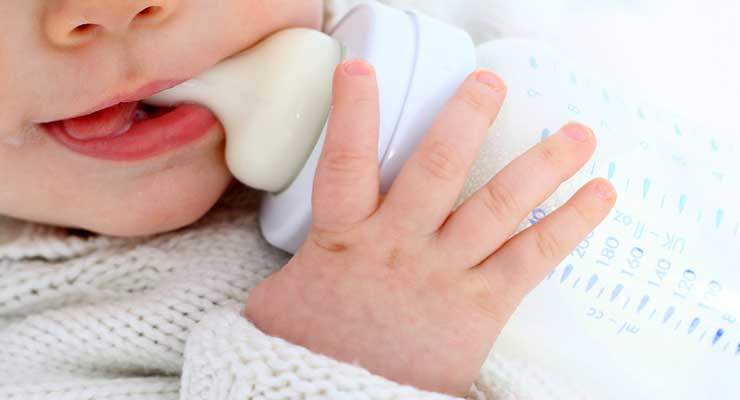The best way to avoid infant formula allergies is to breastfeed your baby. The American Academy of Pediatrics, the World Health Organization, the American Medical Association and the American Dietetic Association all agree that breast milk is the best food for your baby. If you cannot or choose not to breastfeed, however, formula is better to use than cow’s milk because it contains the nutrients that most infants need. A baby is more likely to be allergic to formula than to breast milk. Know what to look for and what to do if your baby is allergic.
About Infant Formula Allergies
The earlier you introduce a food to a baby, the greater the chance he’ll develop an allergy. Unless you breastfeed, the first food you introduce to your baby is typically cow’s milk, the main ingredient in most formulas. Therefore, cow’s milk is the most common allergy for babies. About half of allergic babies do well with a soy-based formula, but the other half is sensitive to soy formula, too.
Signs of Infant Formula Allergies
Signs that indicate an allergy to formula include a rash, eczema, hives, dry or flaky skin and vomiting. During feeding, an allergic baby may be fussy or uncomfortable. Your baby might also be gassy or colicky if she is allergic. She may develop a red ring around her rectum that doesn’t clear up like diaper rash does. Some babies may have diarrhea or constipation. Other babies spit up excessively.
Extensively Hydrolyzed Formula
Allergies are increasing in developing countries worldwide, according to the U.S. Food and Drug Administration. If you suspect that your baby has a formula allergy, talk to your doctor about which type of formula to use. According to the FDA, the American Academy of Pediatrics recommends that infants who develop allergies drink an extensively hydrolyzed, also called an EHF, formula, a modified formula that reduces the proteins that cause allergies. EHF formulas can also prevent allergies from developing.
Whey-Protein Formula
If you or your partner has allergies, talk with your doctor about starting your baby on an EHF formula from the start, if you aren’t going to breastfeed. The preferred EHF formula to prevent allergy symptoms, according to the FDA, is a 100 percent whey-protein partially hydrolyzed formula. These formulas do not treat allergy symptoms; your baby’s doctor can do that. Do not give your baby goat’s milk, almond milk or rice milk because they are not safe for babies.
Getting Better
After you switch formulas per your doctor’s recommendation, your baby’s allergy symptoms should clear up in two to four weeks. Most infants outgrow a milk allergy by the time they are 3 to 5 years old. Some kids, however, never outgrow it.





